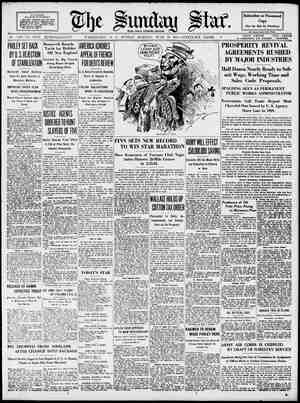Evening Star Newspaper, June 18, 1933, Page 67
You have reached the hourly page view limit. Unlock higher limit to our entire archive!
Subscribers enjoy higher page view limit, downloads, and exclusive features.
Fiction Features PART 7. —_— Magasine WASHINGTON, D. C, JUNE 18, 1933. S o The Sunfhny Stae 16 PAGES. — e FIGHTING CHARITY RACKETEERS How Do Our Relief Agencies, Which Will Spend a Billion and a Half This Year, Meet ths Menace of the Charity Racketeer?—How Much Charity Is Wasted by Fraud and Carelessness?— How Much Goes to Persons in Real Need? “She gave up her job to become eligible for relief—and now she lives without working.” T was the morning set aside for the weekly distribution of free coal to the needy, and the policemen at the precinct station were preparing for an exceptionally busy day. It was cold outside, and the bank holiday, which ended that day, was expected to have in- creased the demand for free fuel. But, to the surprise of the police, an exceptionally small number of persons appeared. And, what was more puzzling still ne of the more familiar appii- cants of the past was in the line. Previ- ously there were certain familiar faces that never failed to claim their share of the free fuel. On this day they were conspicuously absent. BY ARTHUR STRAWN Puzzled at this inexplicable loss of patronage, the sergeant detailed a police- man to make a tour of the neighborhood to find out what was the matter. He re- turned in a little while with a startling explanation: He had discovered the whereabouts of practically all the per- sons who had been in the habit of re- ceiving free coal—they were lined up outside a neighborhood bank, preparing to withdraw money made available again by the ending of the holiday! All of them had presumably been so needy that they had been unable to buy fuel. Yet the ones who had seemingly been the poorest were the very ones found to be possessors of bank accounts, and, there- fore, with no immediate need of any form of relief. I$ §s incidents such as thig that find —Drawing by Harve Stem. their way into newspapers and cause the sober reader to ask a few pertinent ques- tions concerning the whole program of relief, which last year alone cost the Nation in the neighborhood of a billion dollars, and which this year will prob= ably cost half again as much. It is the taxpayer who must foot this bill. And though the Nation is unanimous in its desire to see that no one is without food, clothing and shelter, the taxpayer is Justified in asking how efficiently these ends are being achieved by the vast exe penditures that are being poured intg relief budgets. How much of the money is being diverted, through inefficieney or chis
